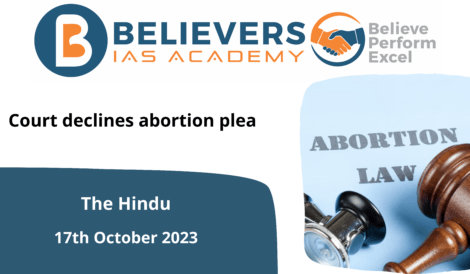Kerala Governor signs a Bill, reserves seven for Presidential assent
Context
The gubernatorial assent to the Bill occurred after the Supreme Court requested that Mr. Khan’s office be considered in its recent decision holding Governors accountable for acting within the four corners of the State assembly without exercising a non-existent veto authority over Bills brought to them for assent.
What is the background of the issue presented here?
- The Kerala administration has brought attention to the fact that out of the eight bills that were approved by the State Assembly, three have been sitting with the Governor for over two years, and the other three for over a year. Concerns have been raised by the Governor’s protracted failure to consider the Bills.
- The ruling follows a petition filed by the Kerala government challenging the Governor’s decision to withhold assent to certain bills.
- It outlines concepts that are expected to have ramifications in comparable cases, such as one in Tamil Nadu and Punjab, where the Governor withheld assent to ten critical bills.
What are the powers of the governors over the state bills?
- Article 200: The procedure for presenting a bill enacted by a state’s legislative assembly to the governor for ratification is outlined in Article 200 of the Indian Constitution. The Governor can choose from the following:
- Grant Assent: The Governor may sign the Bill into law by approving it.
- Return for Reconsideration: The Assembly may receive a request from the Governor to review certain sections of the bill or the entire bill.
- Reserve for the president: The Governor may set the Bill aside for the President’s consideration. This is required under certain circumstances, such as when the Bill violates the Constitution or the Directive Principles of State Policy (DPSP), or when it jeopardizes the authority of the state high court.
- Withhold Assent: Even so, an option, this is not commonly exercised by the governors as it can seen as showing favouritism
What was the resolution passed by the Supreme Court regarding the holding of bills?
- According to the Supreme Court, measures forwarded to the governor for assent should be returned “as soon as possible.” This is to avoid governor procrastination and indefinitely delaying state Legislative Assemblies.
- When a Bill is enacted by a State’s Legislative Assembly, it must be forwarded to the Governor, according to Article 200 of the Constitution. The Governor can announce whether or not he agrees with the Bill.
- A Governor, on the other hand, cannot withhold assent to a Bill indefinitely. They must instead return it to the Assembly with a statement. This could contain suggestions for Bill modifications.
- Supreme Court directs Governor Khan to adhere to its latest judgment, emphasizing the Governors’ role within the boundaries of State legislature without a non-existent veto power.
What was the action taken by the Governor of Kerala after the judgement?
- After a two-year pause, Governor Arif Mohammed Khan signed the Kerala Public Health Bill, 2022.
- Despite signing the public health bill, Governor Khan and the administration remain at odds.
- Khan has set aside seven measures for consideration by the President.
Why were the bills passed on to the President for consideration?
- Under Article 200, Governor Khan has the authority to reserve Bills for consideration by the President.
- There is no set timetable for the President to decide on the outcome of a measure.
- The bills reserved for Presidential review suggest a desire for greater scrutiny and intervention.
- The lack of a defined date for the President’s decision adds uncertainty to dispute settlement.
Which are the bills passed on to the President for consideration?
- Includes the Kerala Lok Ayukta Amendment Bill, which the Governor opposes since it allows the political administration to examine Lok Ayukta declarations.
- The governor is opposed to individuals acting as judges in their own right.
- The Kerala University Amendment Bill is also included:
- Attempts to depose the Governor as Chancellor of the State Universities.
- The government is given the authority to designate “renowned persons with academic expertise” as Chancellors.
Conclusion
In conclusion, while the passage of the Kerala Public Health Bill may alleviate some concerns, the greater political and legal issues between the Governor and the Kerala government remain, and the reserved bills for Presidential review imply that tensions are likely to stay.




